While only a small piece of the SEO puzzle, backlinks have an immense impact on a website’s search engine rankings, traffic, and overall business success.
Still, earning backlinks in an organic way is extremely costly and time-consuming, which is why buying backlinks is getting enormous traction today.
Buying paid links is a controversial topic, so we’re here to help you make sense of it. In this guide, you’ll find answers to the following questions:
- What is link buying?
- Should you buy backlinks?
- Is buying links legal?
- How can you buy backlinks safely?
- Where to buy backlinks?
… and even more. Let’s jump right in!
What Is Link Buying?
Before we go any further, let’s make sure we’re on the same page about this term. So, buying links refers to the practice of paying another website to place a link leading to your site on its page.
You can buy backlinks in a variety of ways, mainly through paid guest posts, direct link insertions, directory listings, publishing on private blog networks (PBNs), and press release distribution services.
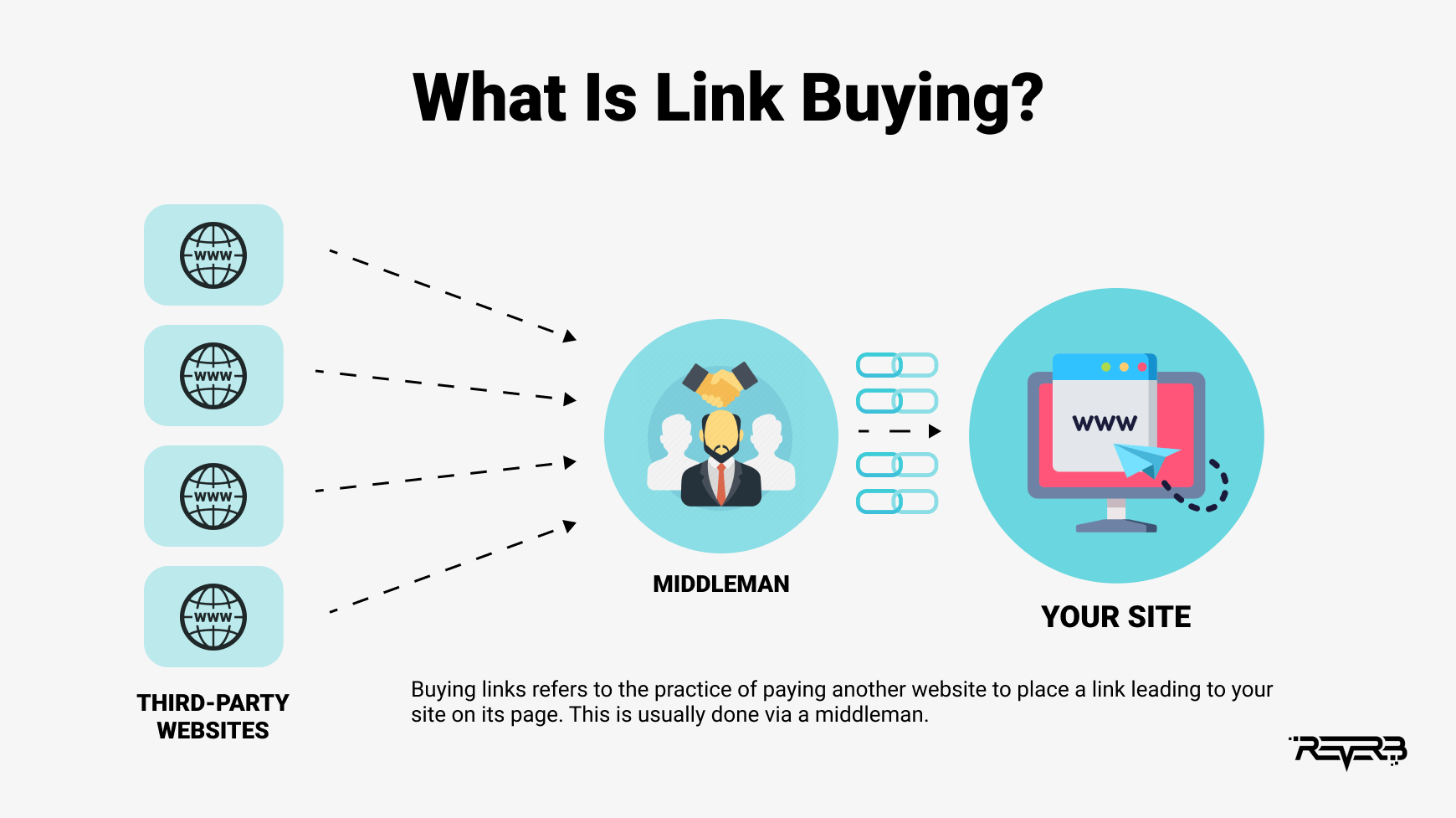
While in most cases, link buying involves payment, Google identifies any exchange aimed at acquiring a backlink — be it money, goods, or services — as a “paid link.”
Should You Buy Backlinks?
Buying backlinks has been a hot topic for the past decade, meaning that only one thing is for sure: backlinks matter.
So what are the primary reasons behind purchasing links? Let’s explore the key arguments.
Surprisingly, the price of paid links can be lower than the cost of generating organic backlinks. This is because organic backlinks only happen when someone places a link to your site on theirs when they find it beneficial for their audience.
For this, you’ll need to hire professional content writers, graphic artists, and subject matter experts and work on your organic blog promotion for many years to gain credibility.
Buying backlinks is faster and easier than crafting valuable content and promoting it to attract backlinks organically. The latter can take months, while new sites might spend years on this.
When buying backlinks, you invest in improving your search engine rankings, growing traffic, and building brand awareness. Moreover, when done carefully and working with reputable sites, there’s virtually zero risk of a penalty — it’s hardly possible for a search engine to figure out whether the link is paid.
Is Buying Links Legal?
You may have already pored over tons of posts that attempt to address this question, and perhaps you’re confused about your findings. Breathe a sigh of relief.
According to Google, buying links is a normal part of the web economy, and it’s not a violation as long as certain requirements are observed — it’s legal to use such links when they’re qualified with a rel=”nofollow” or rel=”sponsored” value.
While Google deems it okay to buy and sell links for advertising and sponsorship purposes, it strongly disapproves of buying links for passing PageRank.
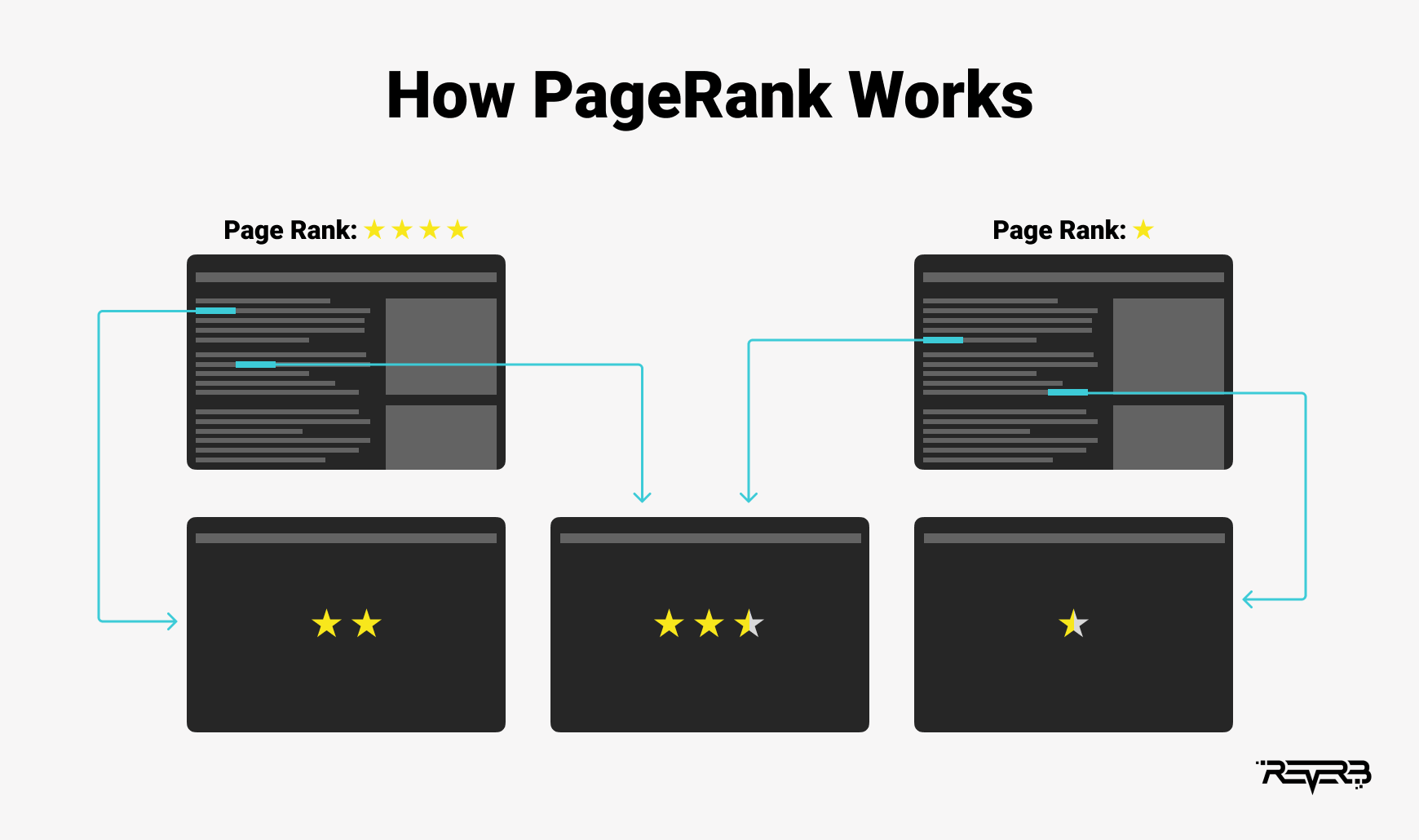
In simpler terms, Google opposes exchanging links with the aim of manipulating search results, considering such a practice to be link spam.
So what exactly does Google view as link spam? Here are some of the most common examples:
- excessive cross-linking
- extensive campaigns featuring keyword-stuffed, anchor-rich content
- using automated systems for generating links to your site
- forum posts with links
- exchanging money, products, or services for a backlink that passes PageRank
- requiring a backlink as part of a Terms of Service or similar arrangement
What are nofollow and sponsored link attributes?
Now, you might wonder what the rel=”nofollow” and rel=”sponsored” attribute values mean. These values provide contextual prompts to search engines:
- the rel=”nofollow” value informs that the link was created as a reference
- the rel=”sponsored” value indicates that the link was generated as part of a sponsorship agreement
In code, they look like this:
<a href=”https://example.com”rel=“nofollow”>anchor text</a>
<a href=”https://example.com”rel=“sponsored”>anchor text</a>
Neither a “rel=”nofollow” nor a “rel=”sponsored” link affects the search engine rankings since Google doesn’t transfer PageRank or anchor text across them. In addition, Google doesn’t crawl nofollow links.
In other words, purchasing links with these attributes aligns with Google’s guidelines. However, they bring lesser (if not zero) value to SEO than dofollow links; Google sometimes counts a nofollow link, and sometimes it doesn’t.
What are dofollow links?
Dofollow links are backlinks without sponsored or nofollow attributes. In code, they look similar to this:
<a href=”https://example.com”>anchor text</a>
Google considers dofollow links as indicators of endorsement, passing PageRank to the linked-to page, which is where they help boost the page’s Domain Authority and thus win better rankings.
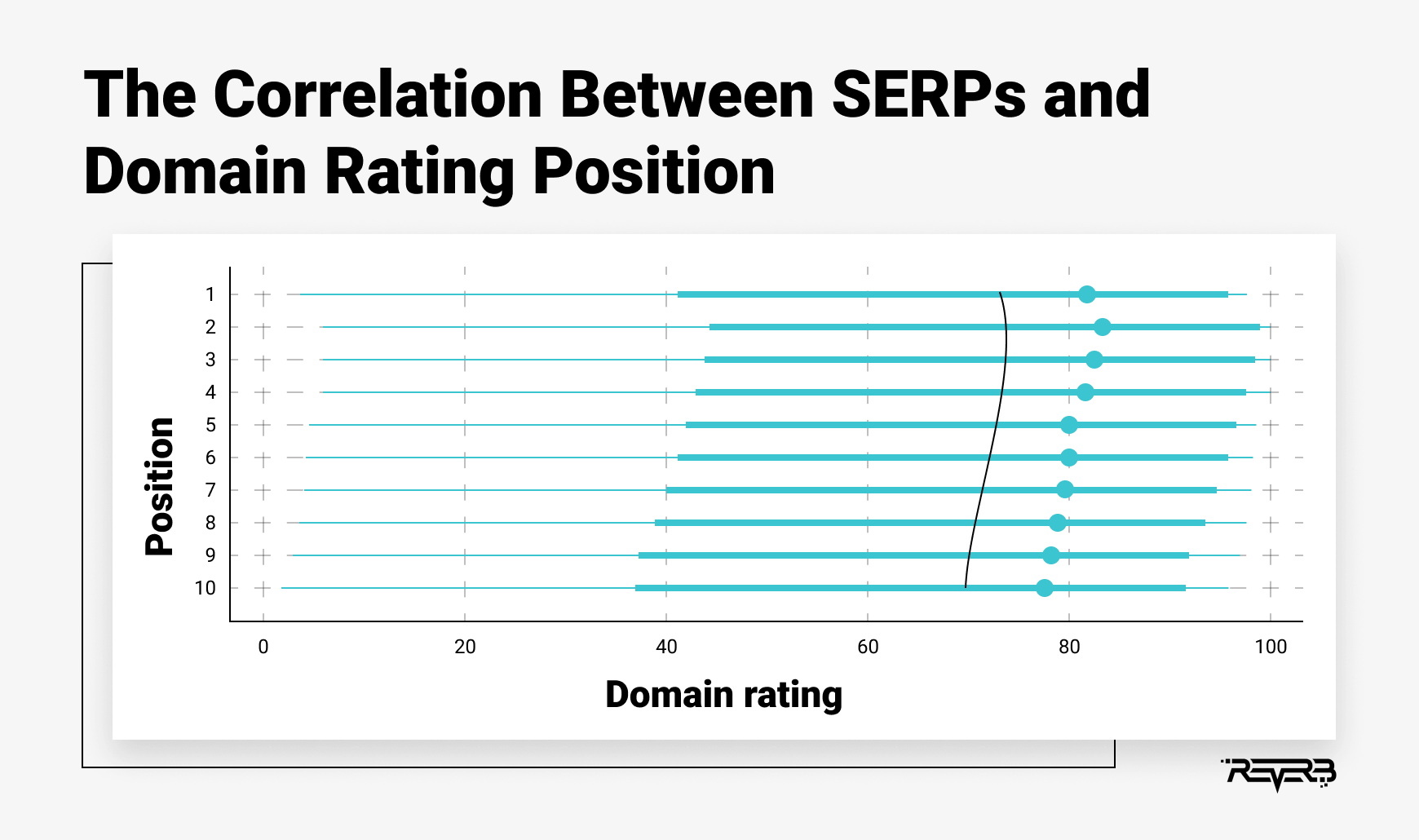
How Google penalizes websites for buying and selling links
Google uses sophisticated algorithms specifically designed to identify and penalize websites that engage in buying or selling links. The main algorithm is called the Google Penguin algorithm. It analyzes websites’ link profiles, looking for unnatural link building patterns, such as large numbers of low-quality links from irrelevant or spammy websites.
Once manipulative link building practices are detected, a website may be subject to one or more of the following penalties:
- manual action penalty, which can lead to a significant drop in search engine rankings and visibility
- algorithmic penalty, which can automatically detect and devalue low-quality or spammy links
- deindexing, meaning that Google can completely remove a website from its search index (this usually happens due to repeated violations of Google’s guidelines)
Despite this, buying and selling links is still an extremely popular practice. How come?
While Google opposes buying and selling links for the sake of better rankings, it highly approves of valuable quality content.
So here’s the answer: you must plan your link building thoughtfully, adding value to the Internet. You can still continue to buy backlinks without the fear of getting penalized when you follow some important rules and tips.
How To Buy Backlinks Safely: Do’s & Don’ts
So, here’s the most exciting part — we’ll share some actionable tips about how to buy backlinks to avoid penalties and damage to your online reputation.
Do’s
Buy backlinks only from reputable sites to act legally in the eyes of Google. Before starting any negotiations, make sure the website you’re considering for link building:
- isn’t part of a PBN
- has a good Domain Authority/Domain Rating and generates over a thousand visits per month
- is relevant to your business niche
- has thousands of high-quality links to and from authoritative sites in your niche
- shares valuable content, not content produced solely for SEO purposes
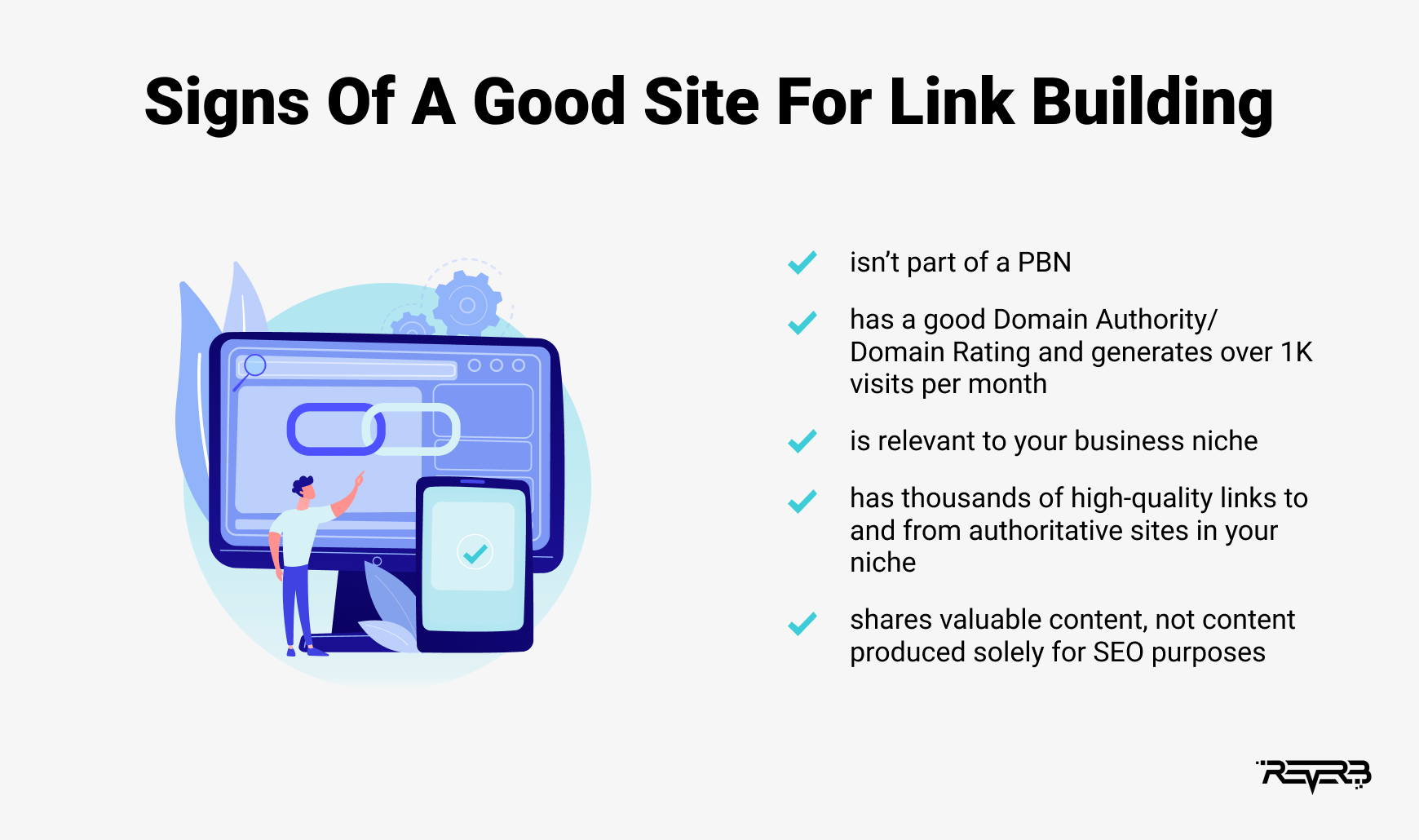
Don’ts
Your link building success will entirely depend on the quality of the site you want to get a link from. And, by the way, this applies to any type of link building, not only the instances when you’re paying for links.
While Google can’t know for sure whether a link is paid for or not, if it doesn’t like the site that links to yours, you’re at risk of getting penalized.
Given that, none of these is the best place to buy backlinks for SEO:
- a site that appears untrustworthy at first glance, with poor design, no images, and vague or nonexistent author bios
- a site with low Domain Authority and zero traffic
- part of a PBN — a network of websites created solely for the sake of selling links
- a site overstuffed with ads
- a previously penalized site
- a site that has plenty of toxic links
- a site that’s selling links publicly (it publicly mentions its paid link-selling terms somewhere on the site)
- a site containing numerous links to porn, gambling, or other potentially restricted content
- a low-cost gig site like Fiverr, UpWork, Freelancer, etc. — you risk ending up with aggressive link spam that can damage your online reputation for good
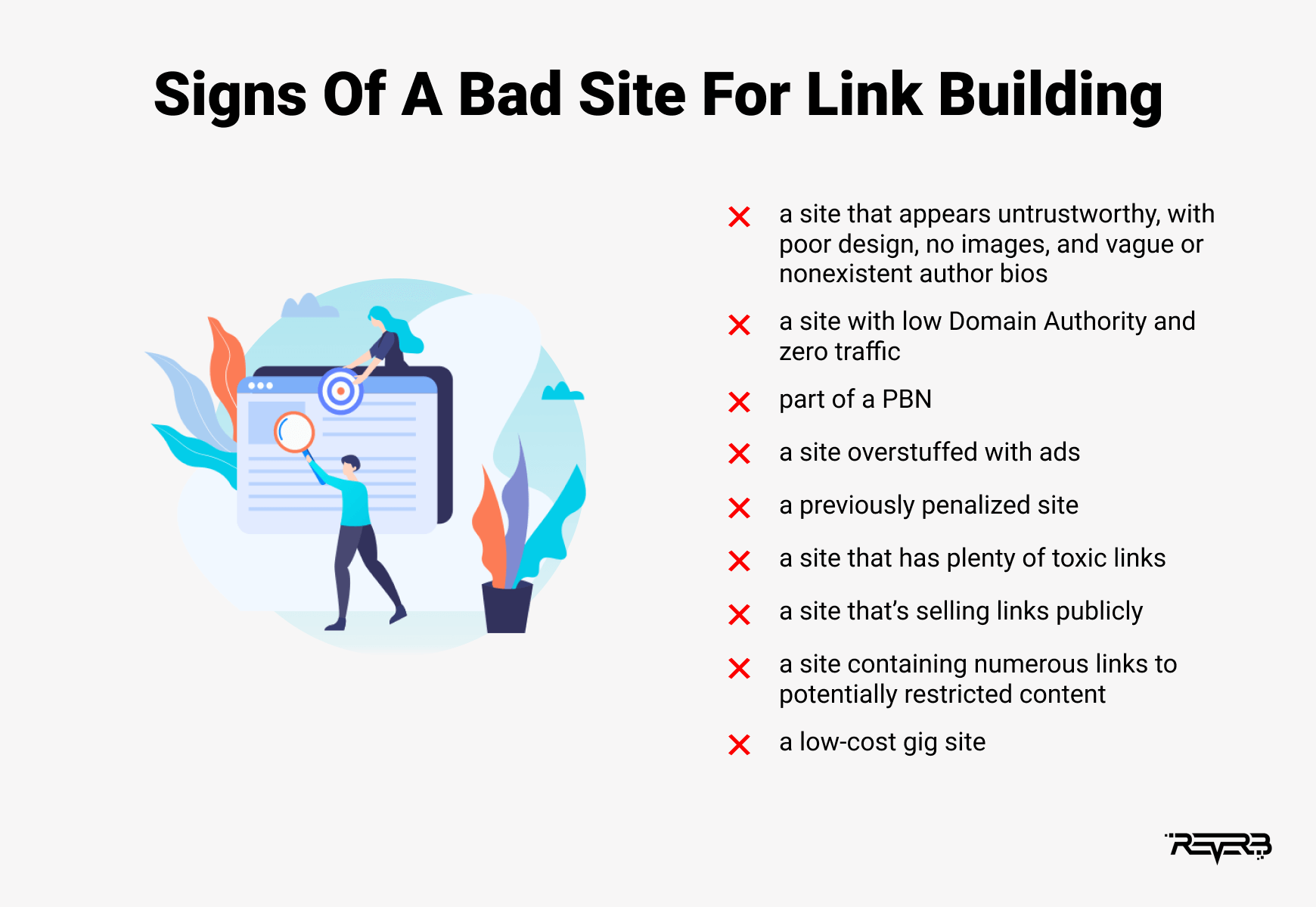
Pro tips to ensure a site is reputable
Unless you choose to partner with a professional link building agency, it’s crucial to double-check each website you’re considering for buying links since it can make or break your entire SEO strategy. Here are some questions to help you:
- Would you read the content if search results brought you to this site? Does it contain quality images, a logo, and author bios?
If the answer is no, it obviously isn’t worth paying for links on this website. To top it off, you’ll risk ruining your reputation with Google when placing your links on a poor-quality website.
- Does the website get consistent search traffic?
If a website gets consistent organic traffic, Google sees it as a valuable resource. To check it out, you can use online tools such as SimilarWeb, Alexa, Ahrefs, or SEMrush. As an alternative, you can ask the website owner to provide you with their traffic statistics.
- Has the website been selling large numbers of links?
It’s vital to check whether the website has been created for the sake of selling links — in that case, a penalty might be just around the corner. For this, check their recent posts for unnatural, exact-match anchors that are often oddly distributed throughout the content.
Where To Buy Backlinks
Apart from getting regular spammy offers from individual link builders with large databases of sites (which are usually part of the PBN or simply low-quality blogs created solely for the sake of making money), you have several proven options, each with its pros and cons:
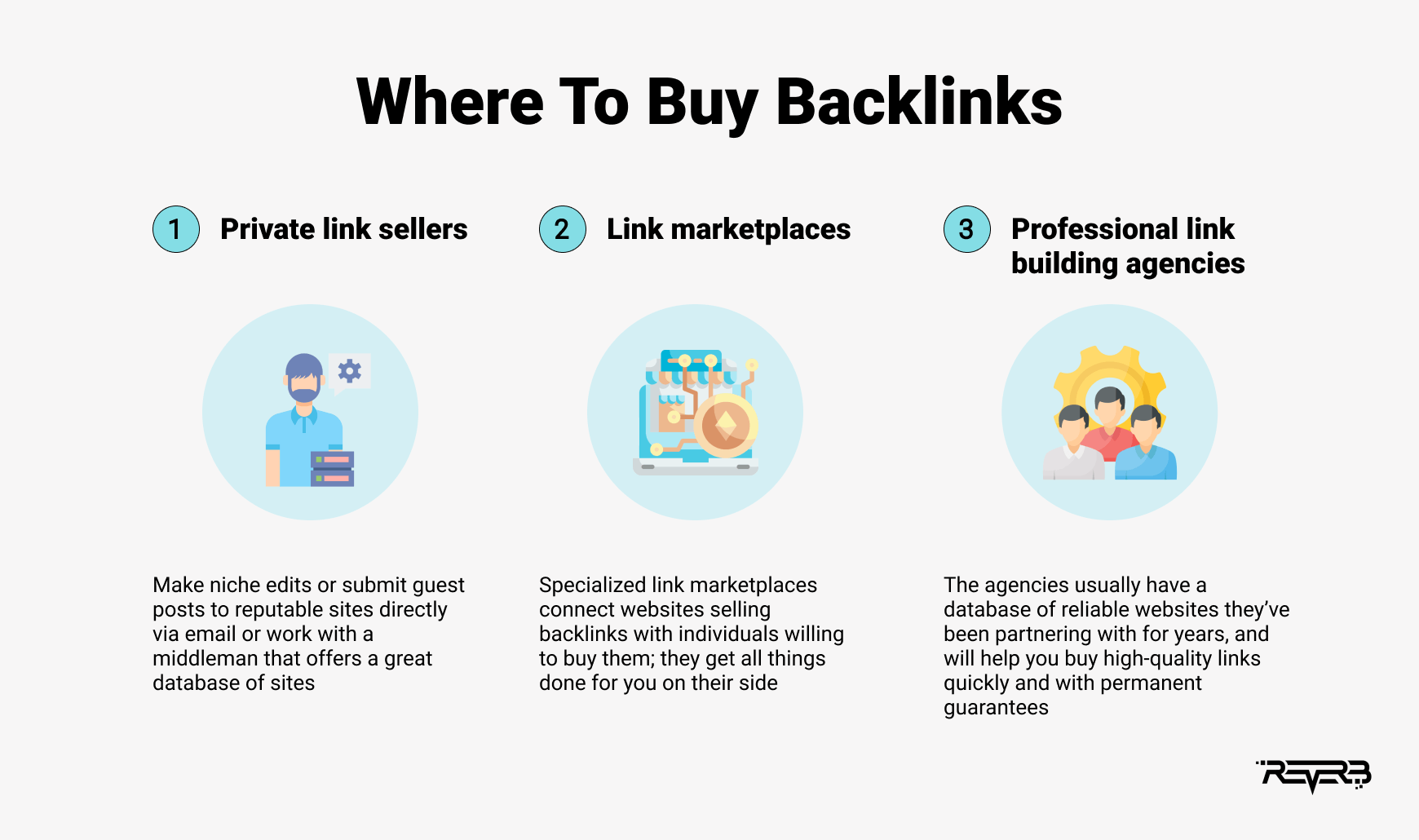
- Private link sellers to make niche edits. You can buy links directly from a site. Most often, reputable sites never publicly advertise that you can buy SEO backlinks from them, which is why this process takes place in private messaging (via email). Making a list of relevant sites and writing emails usually requires time and effort. However, there aren’t any middlemen involved, and once you seal the deal, your link will go live shortly.
- Link marketplaces. Specialized link marketplaces like Collaborator connect websites selling backlinks with individuals willing to buy them.This could be your best bet if you don’t have time to cover research and negotiation, including searching for relevant sites, finding email addresses, writing emails, etc. The marketplace gets all these things done for you on their side. Usually, this is the most expensive option, but it brings you guaranteed results.
- Professional link building agencies. Likewise, partnering with a digital marketing agency to buy backlinks for SEO will save you time and stress. They usually have a database of reliable websites they’ve been partnering with for years and will help you buy high-quality links quickly and with permanent guarantees. Unlike link marketplaces, digital agencies provide a broad range of services, meaning they value their reputation and buy SEO backlinks only from verified sources. This makes such a firm the best place to buy backlinks for SEO.
How Much Do Backlinks Cost?
The prices of paid backlinks vary significantly, depending on the intermediaries, the type of link, the industry, and the site’s Domain Authority/Domain Rating. Costs can range from $10 to $8,000.
Recently, Ahrefs reached out to 450 sites across 9 niches asking to buy a link on their sites in order to find out how much backlinks cost. According to their study, you have to shell out $361.44 on average for a niche edit, while the average price for a guest post is $77.80; the price to pay for links directly depends on the website’s Domain Rating.
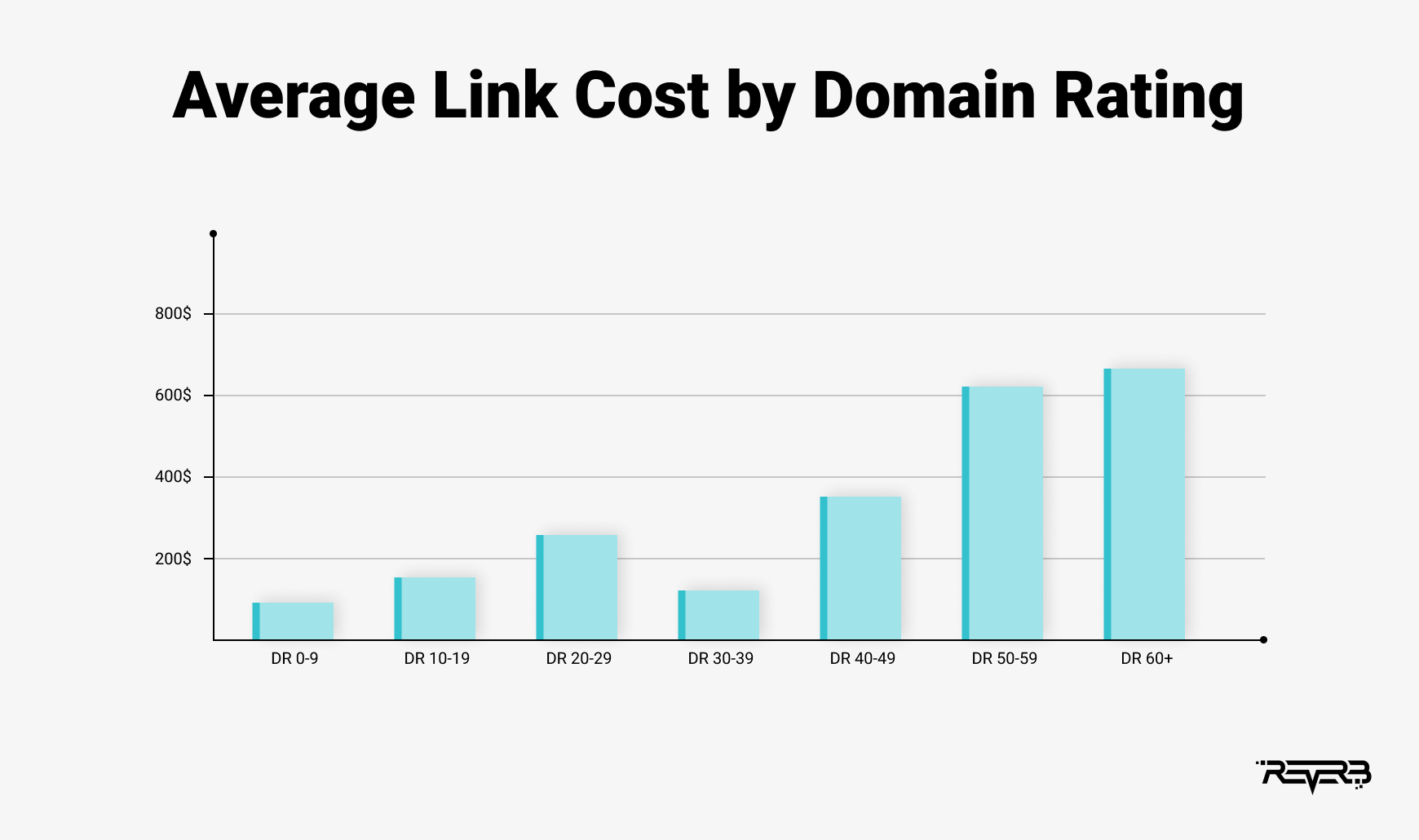
Also, as per the latest research by Digital Gratified, link building cost varies between $60 to $5,000 per link, depending on your preferred link quality, domain rating, and industry.
We’ve also browsed the net for prices. In fact, most offers are much more expensive than Ahrefs’ findings:
1) Here, we see a single link insertion costs an average of $600.
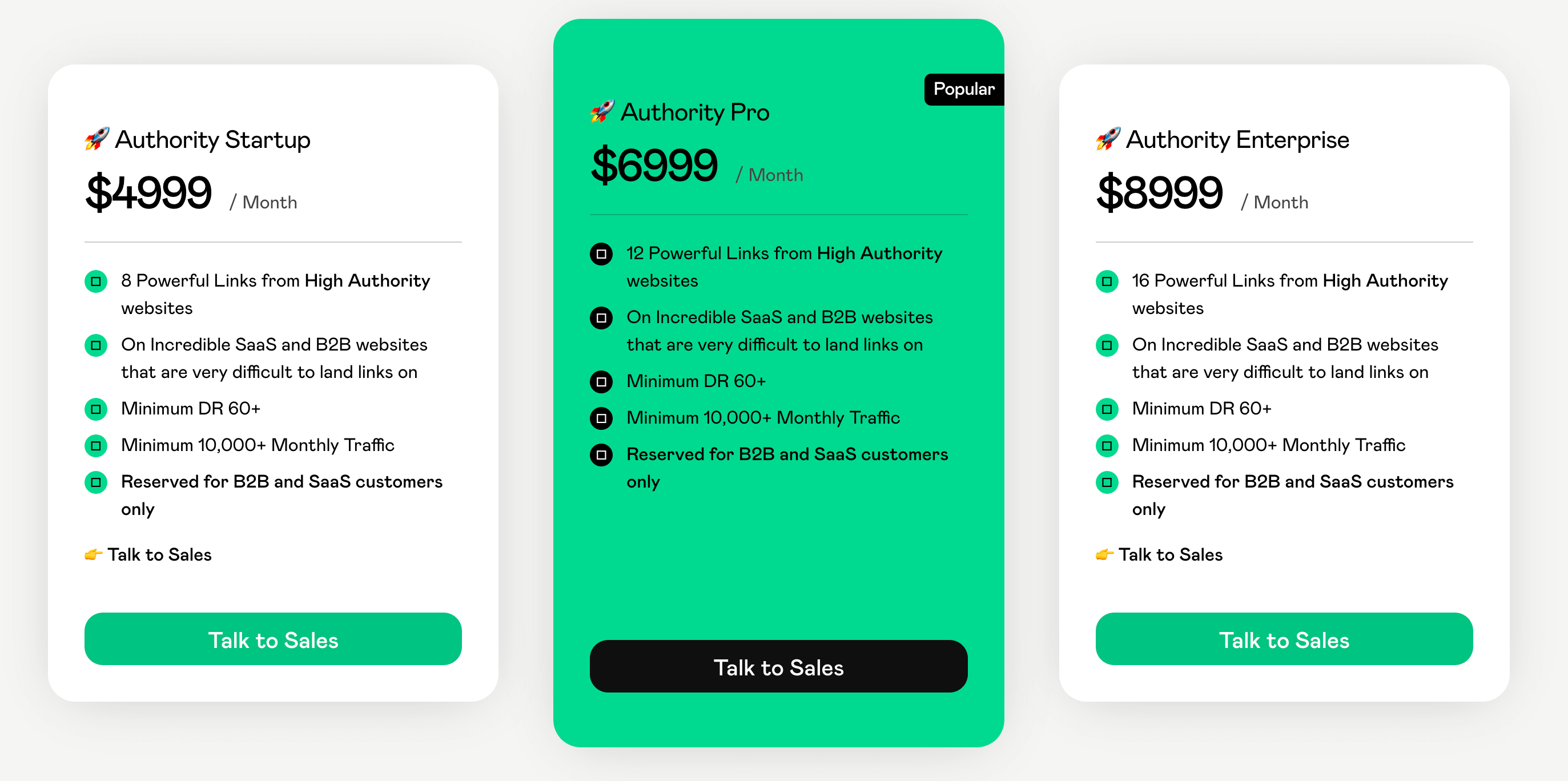
2) The cost of a single niche edit on a reputable site starts from $239.
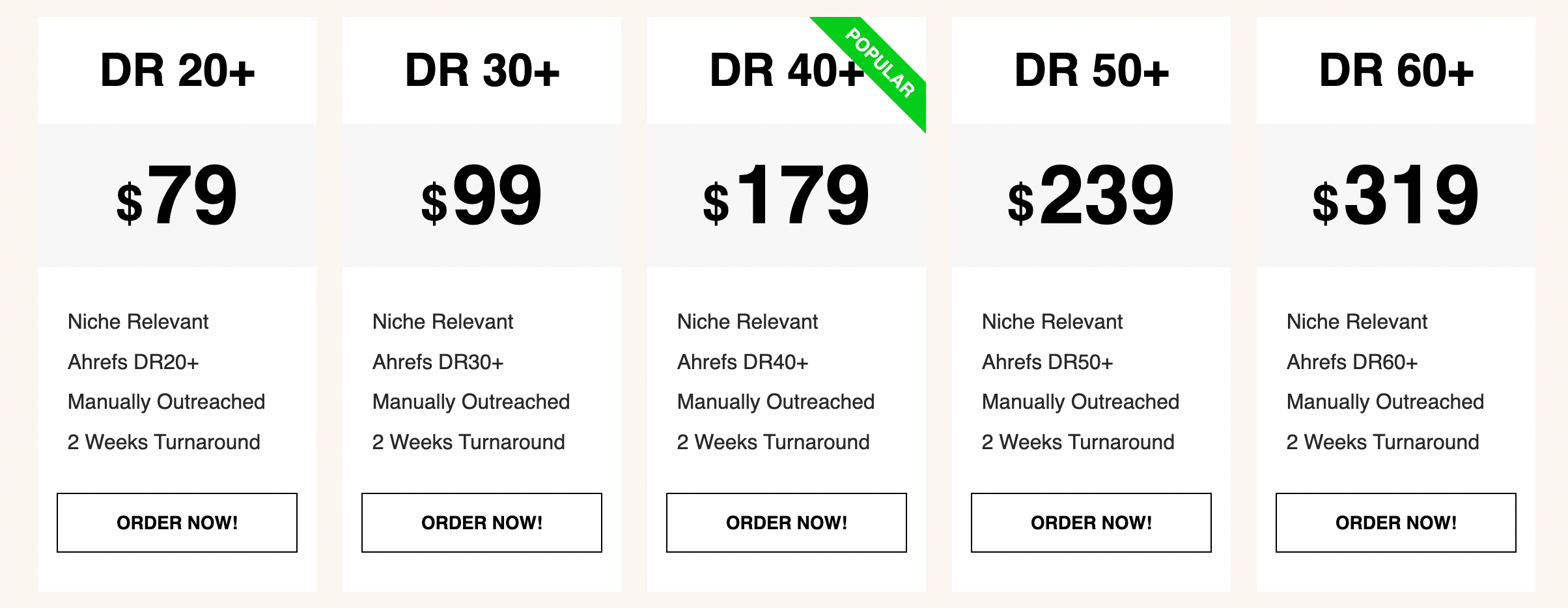
3) The price of a guest post on a high-quality site costs $600.

Conclusion
Buying links is an integral part of successful site promotion. If it’s done carefully, it can bring valuable results. However, if you choose to DIY, your link building attempts might have adverse effects on your online reputation and waste a lot of your time and effort. It’s always a wise decision to entrust your link building strategy to a professional agency.
At ReVerb, we’ll help you buy high-quality links from reputable sites to improve your SEO results and web page rankings in a safe way. Contact us today for a custom quote on link building services.















